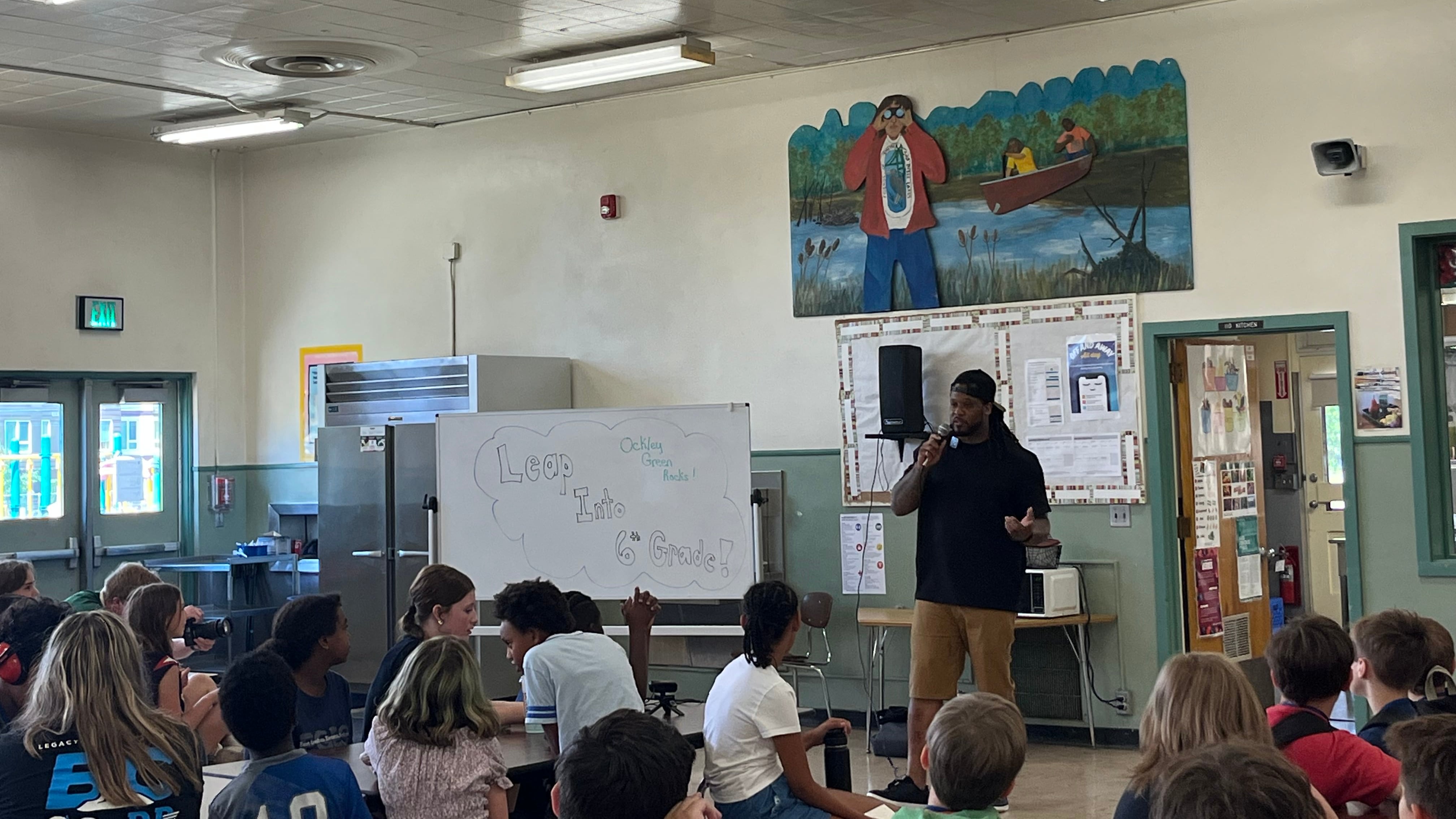It may be summer, but the halls at Ockley Green Middle School in Northeast Portland are still bustling.
The Blosser Center for Dyslexia Education, a Portland-based nonprofit that helps students with dyslexia and other struggling readers, is no stranger to putting together summer camps. But it’s the first year the center has hosted a unique partnership with Portland Public Schools—developing a camp its leaders hope will become a statewide model as Oregon tries to address its literacy crisis.
Since 2023, the Oregon Legislature has charted a course to turn around the state’s literacy outcomes. (Based on statewide assessment data from the 2023–24 school year, English and language arts proficiency is at 42.5%.) That has meant concentrating a bulk of investments on early literacy for the state’s youngest learners, typically from kindergarten through third grade. That’s where the Blosser Center’s camp fills a unique void: It is helping about 35 rising sixth graders this summer catch up on literacy, through a Leap into Sixth Grade camp.
“These are the kids who really suffered in the first through third grade with online education,” says Suzanne LaGrande, the center’s executive director. “We have middle school and high school kids who are reading well below grade level, but most of the reading remediation is focused on K through three. So we have this generation…that we really need to try to do something to help them. And so this is one of the only programs that I know about where we are trying to do that.”
The camp, which runs from 9 am to 1 pm weekdays for about a month, is completely free to participants and broken up into a couple of different blocks. Participants need not have dyslexia to attend. Its students rotate through different blocks, including a small group writing session, an hour of robotics and, crucially, an hour of one-on-one high-impact instruction with a tutor who gets to assess the student’s specific needs and work to bring them up to speed.
The program is the product of some specific state funding allocated toward Ockley Green, says Darcy Soto, PPS’s director of learning acceleration. Its participants were selected through the four elementary schools that feed to Ockley Green, and teachers and principals were asked to identify specific students who were struggling in literacy and could benefit from high-impact tutoring. Any number of metrics could be used to determine the students, Soto says, including performance on assessments or class assignments.
LaGrande says struggling readers deserve investment at all ages, well beyond the allocated funding the state provides. (This year, PPS had to shrink a separate program, its Summer Acceleration Academy, due to a budget crunch. That program now concentrates on early literacy intervention.) Without it, she says, they can fall way behind on other subjects as well, as reading becomes integral to learning more complex material.
“As kids get further and further behind, not only do they get further behind in their classes, but also social and emotional problems really set in…discouragement, frustration, depression,” LaGrande says. “We know what works to get kids to be able to read, but it requires one-on-one, and it requires the time, and that is what we don’t have currently.”
Amanda Beltran is a new tutor who began assisting at the camp after learning of the Blosser Center through a friend. An aspiring educator with a bulk of experience in child care, Beltran says she’s gained newfound confidence in phonics-based instruction through the camp, something experts have said is foundational to reading instruction.
Rachel Holzman, another tutor for Blosser, says the center is using Tattum Reading as its core programming. That curriculum emphasizes fast results through frequency (hence the five-day-a-week tutoring) and immediately plunges students into conquering books. Through a series of games and engaging activities, the program is meant to foster a love for reading alongside science-based techniques, she adds.
But both tutors agree the most rewarding piece of the job revolves around a boost that’s not academic but confidence-based. By building sound relationships with their students over the short weeks at camp, Beltran said it’s been touching to see kids master sentences and get excited when they can summarize the content of a paragraph. That newfound self-assurance is “really special” to witness, she says.
“[We work] on some experiences that may have been uncomfortable for them in the past, like reading aloud in a classroom where they felt like other people were judging them, that sort of thing,” Beltran says. “Being able to recalibrate or reframe those experiences so they don’t feel so intimidated…it’s intrinsically tied to confidence.”
The camp drove that self-empowerment message home at the Ockley Green cafeteria midday Friday, as students packed lunch tables, eagerly awaiting a talk by former NFL running back Alex Green, a Portland-born athlete who has dyslexia. Rather than concentrate his talk on any technical aspects of reading, Green asked a young student to help him tear up a dollar bill.
After she stomped on it and crumpled it in her hands, Green asked the students if they thought they could still buy something with that dollar, using the dollar to string together his experiences struggling in school and being knocked down. At the end, he high-fived a student who shared the thought he could still buy something with the dollar because it still had value.
“No matter what happens in life, you still have value,” he said to a cheering crowd of students.
LaGrande says she hopes this pilot won’t be the last of its kind.
“When kids get behind, they also get discouraged. They internalize the sense that they’re not smart, and the older they get, the more resistant they are to tutoring,” she says. “So the faster we can get them to grade-level reading proficiency, the more we can get them caught up. I’m hoping that PPS will invest in more programs like this to help middle and high school kids.”

